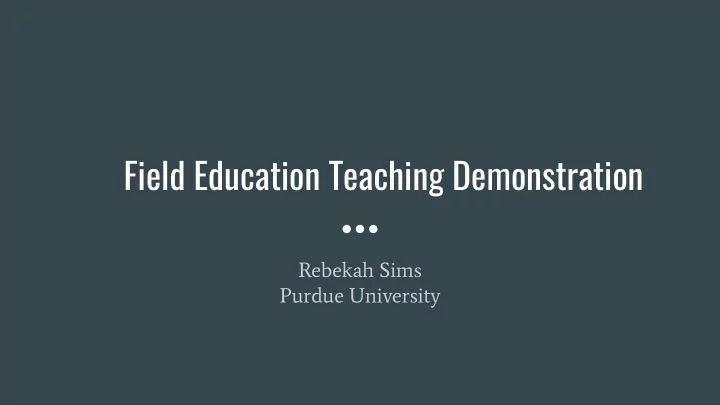

Field Education Teaching Demonstration Rebekah Sims Purdue University
Introduction Hello! I’m very excited to be with you today for this teaching demo. Here’s a bit about me: PhD candidate at Purdue University in West Lafayette, IN ● Candidate for Holy Orders in the Diocese of Indianapolis, pursuing ● the vocational diaconate So, I’m a candidate^2! (And, clearly, an unapologetic nerd.) ● Field: English/Rhetoric & Composition ● Areas of specialization: program administration, intercultural ● competence, curriculum development, digital religion
Teaching Demonstration Overview Outline of Learning Activities Purpose: apply praxis method of theological reflection to the case study, to explore lived theology in the context of a field setting. 1. Zoom orientation and short course overview 2. Review case study 3. Preparatory writing 4. Short lecture on praxis model 5. Small-group discussion of case study and praxis via breakout rooms 6. Whole-group discussion on lived theology of case study and potential theological responses in the field education context
Zoom Features to Use 1. Thumbs up/raise hand icon 2. Chat feature 3. Space bar for un-mute!
1. Please navigate to http://writeic.org/demo 2. Once you reach this website and can see the lesson Let’s Practice! content, press the “thumbs up” reaction on Zoom. 3. If you need help, or if (To use a Zoom feature & access anything seems amiss, press lesson content) the “raise hand” reaction on Zoom.
Field Education I: Course Overview
This course accompanies students’ first-year field placement in a congregation or nonprofit setting. The focus of this course is developing the reflective skills required for building a robust public theology that is lived out in an authentic ministry setting. Emphasis is placed on: 1. Transferring into the course knowledge, skills, and identities from other vocational settings 2. Adaptive, flexible transformation of these and newly gained skills from the field context into an integrative, public theology.
Core Theological Reflection Methods 1. Theology in Action: Praxis 2. Correlation/Correlative Reflection 3. Corporate Theological Reflection See Graham, E. L., Walton, H., Ward, F., & Stuerzenhofecker, K. (2018). Theological reflection: Methods (2nd ed.). SCM Press.
Assignments Course assignments are sequenced and scafffolded -- they build upon one another. Reflective writing is integrated into all assignments. Final assessment is by portfolio. 1. Brief spiritual autobiography (often a diocesan requirement) 2. Systems analysis of field education context 3. Theological development autoethnography 4. Short reflective papers 5. Field education contextual project 6. Final portfolio
Full sample syllabus available at: http://writeic.org/demo/
Brief Recap: Case Study
Three-Minute Prep Writing Please spend three minutes responding in writing to the following question: What is the most important element of this case study, and why? Even if you fi finish writing your initial statement before three minutes is up, keep writing! Add more detail all the way until the timer rings. (Ideas are important -- stunningly beautiful prose is not!)
Praxis A Method of Theological Reflection
“At the heart of theological reflection are questions about the relationship between theory and practice… how to connect theological discourses about the nature of God to the exercise of faith.” - Graham et al., 2018, p. 17
Model of Praxis: Cycle of Reflection-Action in Context
Beyond Articulation of Doctrine: Theology is Communicated in Practice
Praxis is distinct from applied theology.
1. Contextual 2. Dialogic 3. Begins and ends with practice Praxis in Summary 4. Theology shown in our norms of practice.
Immersion Analysis Response Reflection Circle of Praxis/Pastoral Cycle
Historical Roots of Praxis 1. Liberation theology a. Salvation involves present, earthly situation b. Different view of proclamation of Gospel c. Task of formation and Christian nurture 2. Social and political context always matters. See also: Holland, J., & Henriot, P. (1983). Social analysis: Linking faith and justice . Dove Communications.
Recap & synthesis: praxis and its applications
Breakout Room Discussion Instructions
Breakout Room Discussion Assignments 1. What seem to be Paul’s underlying theological commitments, based on his approach to an intergenerational education program? 2. What may be the underlying theological commitments of the sacristans and music program? 3. Identify and describe the sources of conflict in this case study.
Whole-Group Discussion
How Might Paul Respond, Theologically? In a ~500 word discussion post on the classes’ course management system page, you should describe a theologically-informed response that Paul can take to address the conflict in the case study. Your response should explain how this action will help Paul engage the action-reflection-action cycle of praxis. This short writing should be posted on the discussion board at least 48 hours before our next class meeting.
Questions! What would you like to know about the “why” behind this lesson demonstration or about the sample syllabus?
The following materials can be accessed via this link: http://writeic.org/demo/ 1. Sample syllabus 2. Lesson plan for this demonstration 3. Video of the short lecture with captions 4. This slide deck
Recommend
More recommend